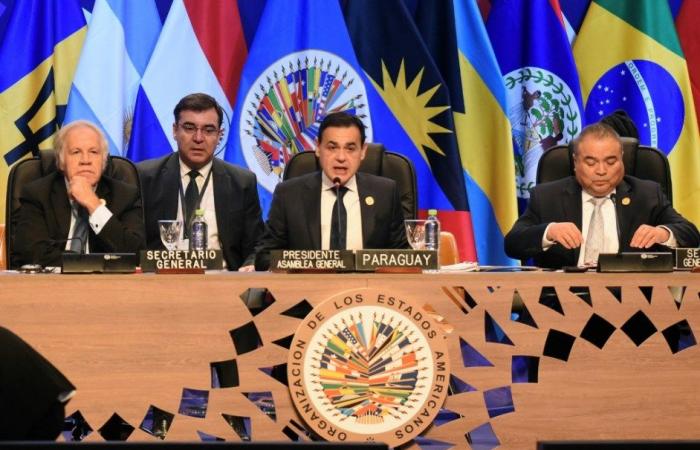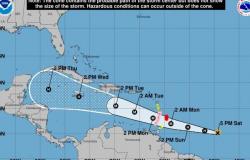afp_tickers
This content was published in
June 28, 2024 – 02:43
The OAS unanimously approved a resolution on Thursday during its general assembly in Asunción, condemning the coup attempt that took place the day before in Bolivia, while focusing on the crises in Nicaragua, Haiti and insecurity in the region.
The resolution ensures that the Organization of American States (OAS) resolved to “strongly condemn the illegal deployment of units of the Army of the Plurinational State of Bolivia” and expresses its solidarity with the Bolivian people.
“We are very proud to be co-sponsors of this resolution and we affirm that our commitment is to democracy,” Richard Verma, deputy to US Secretary of State Antony Blinken, told reporters in Asunción.
The military tried to knock down a door of the presidential palace in La Paz on Wednesday, in a maneuver that the Bolivian president, Luis Arce, described as a “coup d’état.” His government announced this Thursday the arrest of 17 people suspected of participating, including active and retired military personnel and several civilians.
The incident caused widespread condemnation among all representatives of the member states while the events were taking place, including the host president, Paraguayan Santiago Peña, and the Secretary General of the OAS, Luis Almagro.
The Bolivian ambassador to the organization, Héctor Enrique Arce, thanked the “quick reaction” of the member countries and considered it “one of the elements that favored and was decisive for the failure of a destabilizing attempt,” within the framework of this 54th general assembly, which is held at the Conmebol headquarters in Asunción and will end on Friday.
On Thursday, in two squares in the center of Asunción, dozens of opponents of the governments of Cuba, Nicaragua and Venezuela protested to ask the OAS to include in the final declaration of the assembly the demand for the immediate release of politicians imprisoned in those countries. .
At the ceremony, protesters released white balloons “as a symbol for the release of more than 1,600 political prisoners in the region; more than 1,100 are in Cuba,” said dissident Cuban leader Rosa María Payá in statements to AFP.
Cuba was reinstated in the OAS in 2009 after being expelled in 1962, but it does not actively participate in the organization. Venezuela left the organization in 2019, accusing it of being a “space of imperial domination,” and Nicaragua left last year at the request of its president, Daniel Ortega.
– Nicaragua, Haiti and insecurity –
The hemispheric organization also approved a resolution to “follow up on the situation in Nicaragua.”
The Central American country’s relations with the international community have been strained since the repression of protests in 2018 against the Nicaraguan president, in power since 2007 and successively re-elected.
American Verma said that his country “will continue to denounce” the “regime” of Ortega and his wife, Vice President Rosario Murillo, and “advocate for the rights of the Nicaraguan people to be respected in compliance with their inter-American obligations.”
A resolution was also adopted aimed at mitigating the humanitarian and political crisis in Haiti, which recently received a police assistance mission from Kenya to combat gangs that have plunged the Caribbean country into a serious crisis.
Haitian Foreign Minister Dominique Dupuy said her government, newly elected at the end of May amid long-standing political instability, is determined to “take all necessary measures to return to the political transition agreements.”
He also said that he would ensure the “return to the rule of law, social justice and elections to renew political personnel.”
The assembly also focused on the fight against crime and insecurity. Among others, Ecuador’s Foreign Minister, Gabriela Sommerfeld, denounced the “devastating presence in the region (of organized crime) and its alarming transnational nature.”
Located between Colombia and Peru, the world’s largest producers of cocaine, Ecuador has long since ceased to be an island of peace and has become a logistics hub for the shipment of drugs, mainly cocaine, to Europe and the United States.
mry/lm/db






